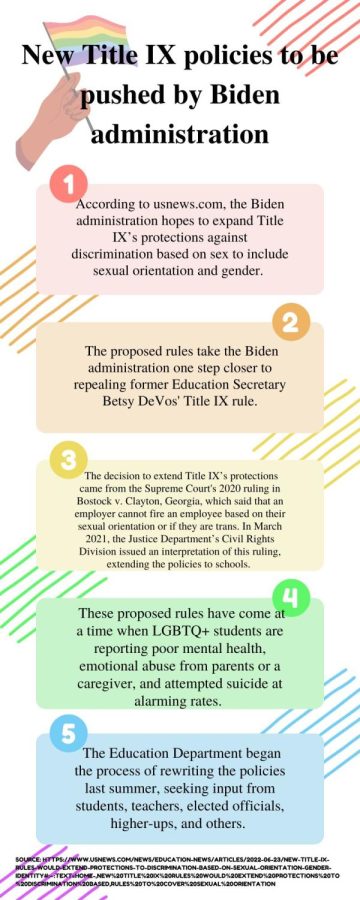Westerville School District Clarifies new LGBTQ Policies
An infographic showing how the Biden Administration is planning to address issues affecting the LGBTQ community.
November 1, 2022
On Sept. 22, the Westerville City School District sent a letter out to parents regarding the new LGBTQ+ policies in response to the new interpretation of Title IX policies. While these policies outline new regulations for dress code and what bathrooms students are permitted to use, one of the biggest concerns among students are the new policies in place for pronouns and names.
Addressed in the letter sent out to parents, staff are no longer permitted to ask students their pronouns. While students are allowed to tell teachers what their desired pronouns are, this request can be overruled by a student’s parent or guardian.
This also pertains to names. If a student is more comfortable with a nickname than their actual name, they are allowed to request teachers to use the desired nickname instead. However, similar to the policy regarding pronouns, parents or guardians of that student are allowed to override the request.
According to superintendent John Kellogg, the Westerville City School District addressed their Non-Discrimination and Access to Equal Educational Opportunity policy 2260 to include sexual orientation and gender years ago.
“There is some case law and Title IX guidance that guides this policy and the protections it obligates our staff to provide to LGBTQ+ students and staff,” Kellogg said.
Policy 2260 is a “core basis of support and protection for LGBTQ+ students” according to Kellogg. He also stated policy has not been changed by the district, but instead the district has “taken the opportunity to clarify for staff and families guidelines that are the ways in which we will protect and support those students in a manner that is consistent with policy 2260.”
The LGBTQ+ policies were not put in place with ill intent to the LGBTQ+ community. According to South’s principal, Michael Hinze, “Now that it [title IX] does apply to gender identity, asking a pronoun could be prompting students to reveal something about them that they are not comfortable revealing to a teacher, thus being a title IX violation.”
A concern about the new policy regarding pronouns is that asking pronouns makes members of the LGBTQ+ community feel comfortable and now that’s not going to happen. “It’s my hope that teachers find ways to make kids feel comfortable, everybody feel comfortable, in their classrooms… that we find a way to make sure everybody feels comfortable within the rules,” Hinze said.
The new policies regarding pronouns came as a shock to junior Tyler Johnson, the head of the GSA club at South. “My immediate reaction was like, ‘What, why not?’” he said.
According to Johnson, the policies originally came from lawyers who recognized that asking students pronouns could get the school into legal trouble. “The main consensus was that if a student is mad that a teacher asked their pronouns they can go home and their parents can sue the school… it wasn’t created to bash or to hurt LGBT youth in our school system,” he said.
There is a concern that prohibiting teachers from asking pronouns could lead to other things being prohibited as well. “If you can’t ask a student their pronouns, what else can’t you ask them? Can you ask them if they’re suicidal? If they’re safe at home? Because it might make them uncomfortable, or it might make them freak out and go tell their parents and you guys [school] might get sued for it,” Johnson said.
Several students at South expressed concern toward the new policies passed. “Theoretically, if my mom didn’t like one of the nicknames I was going by, she could just tell them I can’t go by that anymore , which is gross,” said senior Isa Delgado. “I feel like this school was taking a lot of steps forward and now this is a really really big step back.”
“… School is supposed to be a safe place for students,” said junior Maria Abreu. Many students at South feel like these policies take away a safe place for students who are a part of the LGBTQ+ community or people who use different pronouns and names.
“My best friend has a different chosen name and different chosen pronouns and his mom is not exactly okay with it… I felt like school definitely for him was his safe space because he could be who he couldn’t be at home and now because of this that’s being taken away,” Delgado said.
“I feel like we should be able to create a safe space for people because if you assume a wrong pronoun that could be pretty bad for someone,” said junior Bee Rockwell.
Prohibiting teachers from asking what a students pronouns are could increase the chance of students being misgendered. “The fact that people always assume that I use she/her pronouns just doesn’t make me feel right. I want people to use the correct pronouns for me,” Rockwell said.
Some students at South said they already have noticed changes due to the new policies. “I do realize that teachers don’t ask pronouns anymore,” said Rockwell. Sophomore Titus Everhart said, “Mrs. Young used to always ask for pronouns at the battle of books thing and she didn’t this time…which is really interesting.”
Other students at South are just grateful that they got to let their teachers know their desired pronouns and name before the policies were implemented. “… a lot of my teachers are very open minded when it comes to these types of things, and we already established that we’re comfortable with chosen names and chosen pronouns,” said Delgado.
While other students feel bad for new students who haven’t gotten the chance to connect with teachers before the new policies. “I just feel bad for any freshmen who come in, then they’ll feel the effects of it,” said Everhart.
The policies for bathrooms and dress code did not change much; the district clarified practices already in place.
For bathrooms, students are permitted to use the bathroom that corresponds to what is written on their school record, but accommodations can be made. For dress code, it varies.
According to the letter sent out to parents, the district’s current dress code does not specify what students have to wear to school. It is intended to provide guidance related to what is not acceptable at school.






